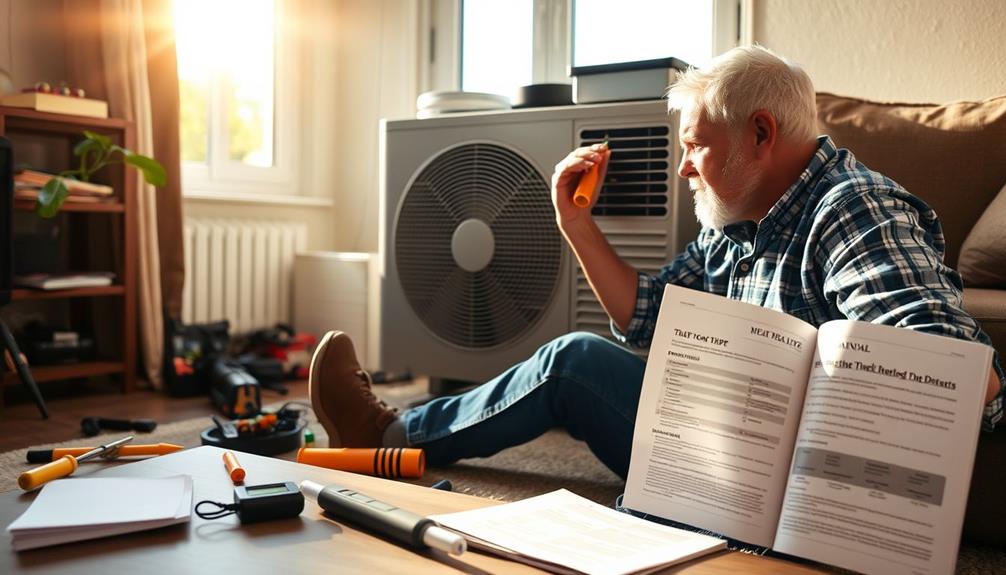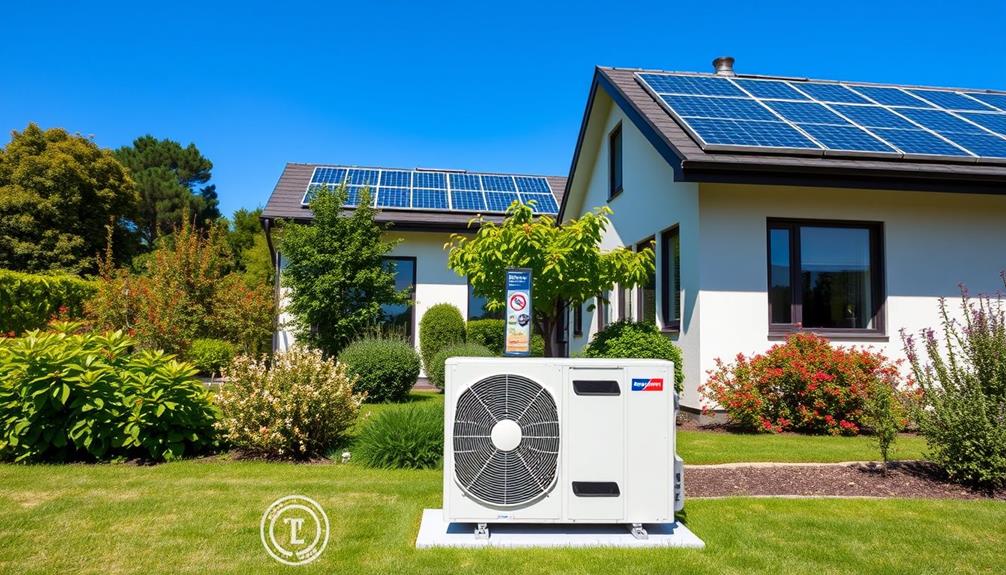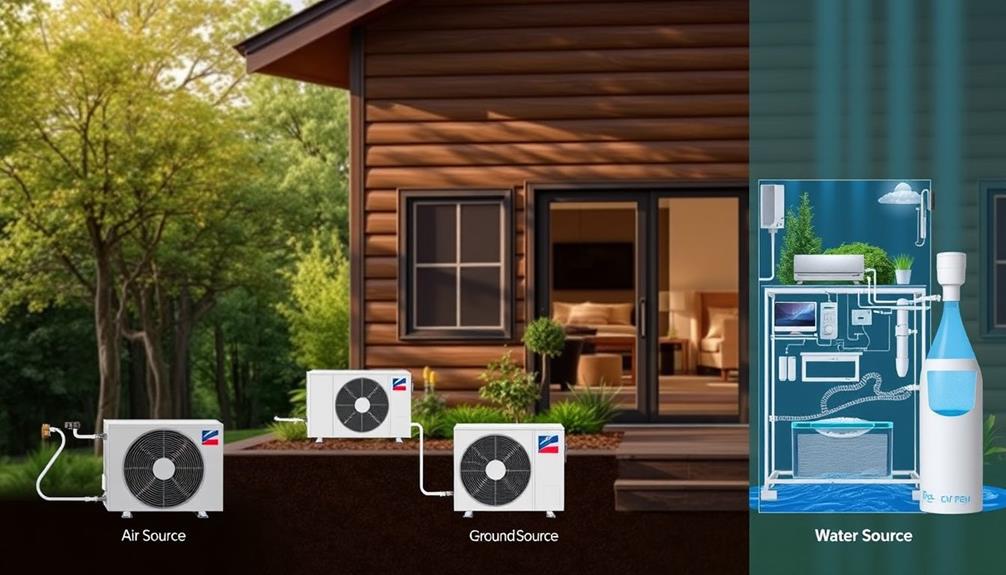Troubleshooting common heat pump issues is essential to keep your home comfortable. Start by checking your thermostat settings and wiring for any discrepancies. If your unit isn't responsive, inspect the circuit breakers and power supply. Look for unusual noises or water leaks around the unit, as these can indicate more significant problems. Be aware of performance issues, such as insufficient heating or cooling, which often stem from dirty filters or low refrigerant. Regular maintenance can prevent these issues from escalating. For more tips and guidance, you might find it helpful to explore further solutions available for homeowners.
Key Takeaways
- Check thermostat settings and wiring for accurate operation and ensure batteries are replaced in battery-operated models.
- Inspect for tripped circuit breakers or power supply issues if the unit is unresponsive.
- Look for refrigerant leaks indicated by hissing sounds, ice buildup, or temperature drops, requiring professional detection.
- Maintain clean air filters and condensate drains to prevent airflow restrictions and water leakage.
- Schedule annual professional maintenance to assess performance, check refrigerant levels, and address potential issues.
Thermostat and Control Issues
When troubleshooting your heat pump, the first step is to check the thermostat and control settings. You'll want to verify that the settings are accurate, as incorrect configurations can lead to inadequate heating or cooling.
Additionally, confirming your home is equipped with advanced technology for maximum comfort can help in identifying issues early. Look for any signs of thermostat issues, such as discrepancies between the displayed temperature and a working thermometer. If your heat pump doesn't respond despite the thermostat signals, it's time to dig deeper.
Calibration problems in modern digital or infrared thermostats may require professional repair to restore proper functionality. Additionally, wiring issues can cause operational failures, so a thorough inspection of the thermostat wiring is vital. If you notice any frayed or loose connections, addressing these issues promptly is necessary for reliable performance.
Regular maintenance is key to preventing control problems. For battery-operated thermostats, checking and replacing the batteries can make a significant difference in performance.
Power and Startup Problems
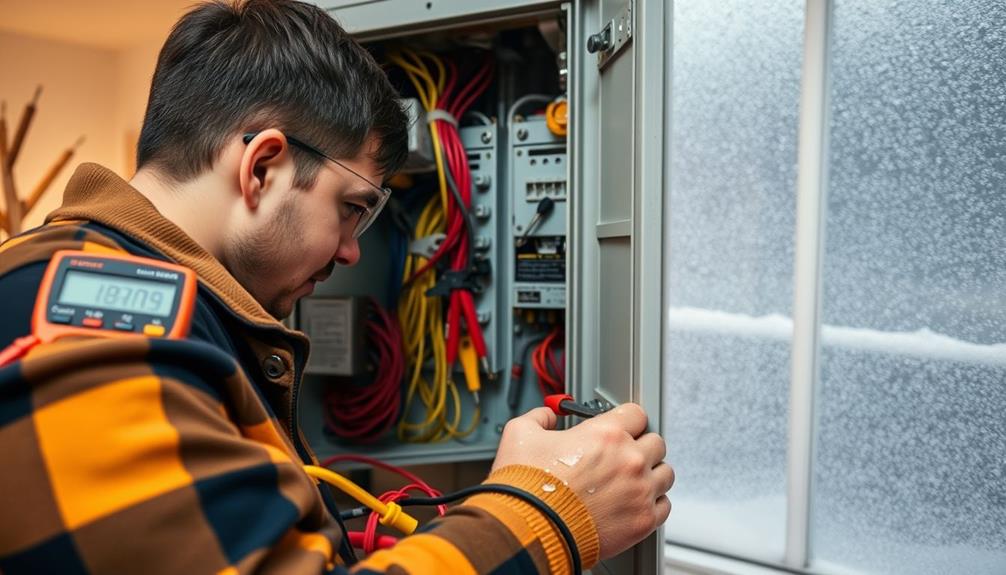
Power issues can be frustrating for heat pump owners, especially when they prevent your system from starting up. One common culprit is a tripped circuit breaker. While you can often reset it, frequent tripping indicates underlying wiring issues that require a professional inspection.
If your heat pump remains unresponsive, check the power supply first. Verify the thermostat is functioning properly and that power is reaching your unit. Regular maintenance is critical to prevent such issues, as it can help identify potential problems before they escalate into major failures, guaranteeing your heat pump operates efficiently and reliably.
A clicking noise during startup can also signal problems, particularly with the startup capacitor. If it's failing, you'll need to replace it to avoid motor activation failure. Additionally, if the outdoor unit isn't turning on, look for faulty contactors, which can impede electrical flow.
If you've verified the power supply and circuit integrity but your heat pump still isn't responding, it's time to call an HVAC technician. Unresponsive units may indicate more serious electrical component issues that need immediate attention.
Don't wait too long, as neglecting these problems can lead to more costly repairs down the line. Taking these steps can help you identify and resolve power and startup problems effectively.
Refrigerant and Mode Switching
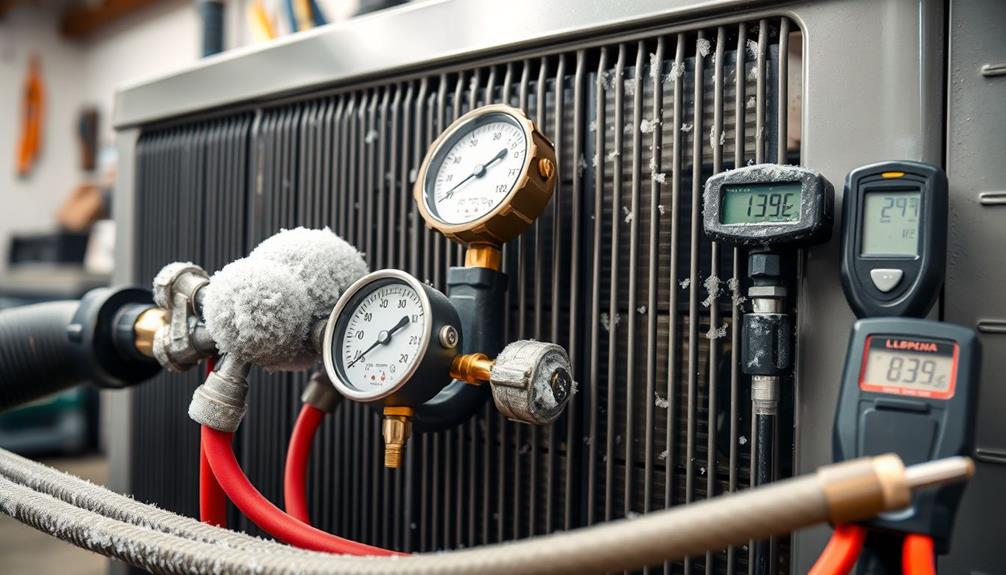
When your heat pump won't switch between heating and cooling modes, a malfunctioning reversing valve could be the culprit.
Additionally, incorrect installation can lead to operational inefficiencies that may also affect mode switching.
You also need to take into account refrigerant leaks, as they can hinder your system's performance and efficiency.
Regular maintenance is key to keeping both the reversing valve and refrigerant levels in check, ensuring smooth operation.
Understanding thermal energy transfer basics can further enhance your troubleshooting efforts.
Reversing Valve Failure
A malfunctioning reversing valve can seriously disrupt your heat pump's performance, leaving you stuck in either heating or cooling mode. If you're noticing cold air blowing in heating mode or your system won't switch to cooling when needed, your reversing valve might be the culprit. This component is responsible for switching the refrigerant flow, and issues can arise from electrical malfunctions, mechanical failures, or even refrigerant leaks.
Here's a quick overview of common signs and possible causes:
| Symptoms | Possible Causes |
|---|---|
| Cold air in heating mode | Reversing valve failure |
| Not switching to cooling | Electrical malfunctions |
| System blowing warm air | Mechanical failures |
| Refrigerant leaks | Damaged components |
| Continuous operation | Faulty reversing valve |
Diagnosing and repairing reversing valve issues typically requires the expertise of professional HVAC technicians. They have the specialized tools and knowledge necessary to handle refrigerants safely and effectively. If you suspect a reversing valve failure, don't hesitate to call a technician to guarantee your heat pump operates efficiently once again.
Refrigerant Leak Detection
Detecting refrigerant leaks is essential for maintaining your heat pump's efficiency and performance. A refrigerant leak can considerably reduce your system's ability to heat or cool your home effectively.
You might notice common signs like hissing sounds, ice buildup on the coils, or a noticeable drop in indoor temperature, all of which indicate a potential leak. Additionally, ensuring good indoor air quality is critical, as a poorly functioning heat pump can lead to increased allergens and pollutants in your home, making regular maintenance checks even more important.
To properly detect these leaks, it's best to contact a qualified HVAC technician. They've specialized equipment and the technical expertise needed to handle refrigerants safely, as strict regulations govern their use.
Performing regular maintenance checks can help identify refrigerant leaks early, preventing costly repairs and ensuring peak system performance.
If you suspect a refrigerant leak, don't wait. An immediate inspection by a professional can determine the source of the leak and allow for necessary repairs.
The technician may also need to recharge your system with refrigerant to restore its efficiency. Remember, addressing refrigerant issues promptly can save you money in the long run and keep your home comfortable year-round.
Regular maintenance is key to avoiding these problems in the first place.
Water Leakage and Maintenance
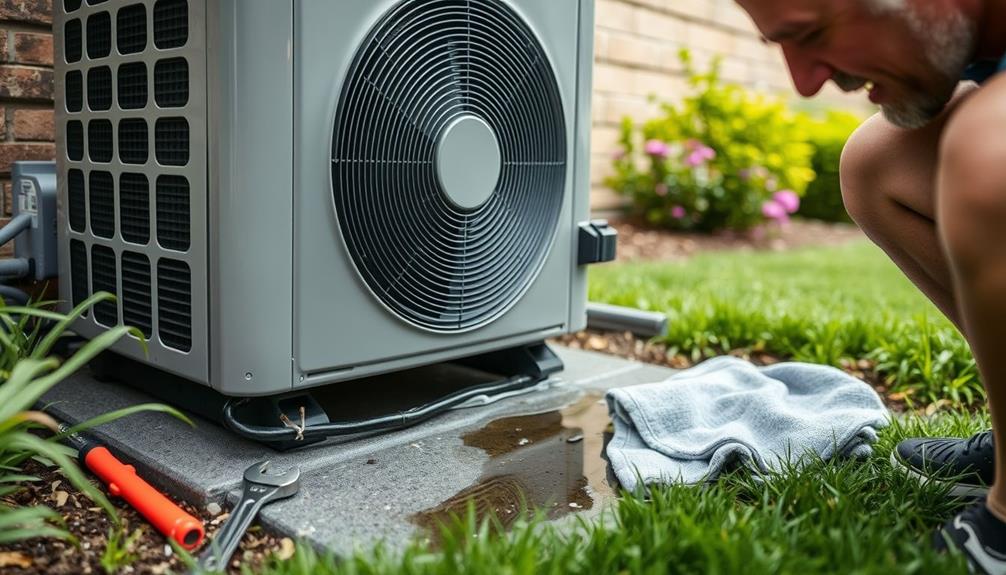
If you notice water leaking from your heat pump, it could stem from common issues like a clogged condensate drain or a frozen evaporator coil.
To prevent these problems, regular maintenance of your heat pump is essential, including understanding the importance of having a proper essential home cleaning kit to maintain the surrounding areas.
Let's explore the causes of leaks and the best practices to keep your system running smoothly.
Common Causes of Leaks
Water leakage from your heat pump can be a frustrating issue, often stemming from a few common culprits. One of the primary causes is a clogged condensate drain. When this drain gets blocked, water can't flow properly, leading to pooling around your unit.
Additionally, frozen evaporator coils can also contribute to leaks. This freezing typically occurs due to dirty air filters or low refrigerant levels. When the ice eventually melts, it can create excess water that leaks out. Regular inspections can also prevent larger issues from developing, similar to how toilet maintenance extends lifespan through proactive care.
Regular maintenance is vital in preventing these issues. Be sure to clean your drain lines and change your air filters every 1-3 months to avoid clogs and leaks.
If you ignore these steps, the excess moisture from leaks can lead to mold growth, which negatively impacts indoor air quality and can result in costly water damage.
As a homeowner, it's important to routinely check for signs of water damage around your heat pump. Addressing any leaks promptly can help you avoid more significant problems down the line.
Keep these common causes of leaks in mind to maintain a well-functioning heat pump.
Maintenance Best Practices
Maintaining your heat pump is essential for preventing water leaks and guaranteeing ideal performance. By following these maintenance best practices, you can keep your HVAC system running smoothly and reduce the risk of water leakage:
1. Replace air filters regularly: Change your air filters every 1-3 months. A clogged air filter can restrict airflow, potentially leading to frozen evaporator coils that might leak water when they thaw.
It's also important to take into account dog nutrition to guarantee a healthy environment, as pets might contribute to indoor air quality issues.
2. Inspect and clean the condensate drain line: Regularly check this line to prevent clogs. A clogged line can cause water to back up and leak, damaging your home.
3. Schedule professional maintenance: At least once a year, have a technician inspect your system. They'll check refrigerant levels and electrical connections, helping to identify issues before they result in leaks.
Additionally, make it a habit to check the outdoor unit for ice buildup, which can indicate airflow problems or low refrigerant levels.
Address any signs of mold or unpleasant odors promptly, as these can affect indoor air quality and signal moisture issues related to water leakage.
Performance and Noise Issues
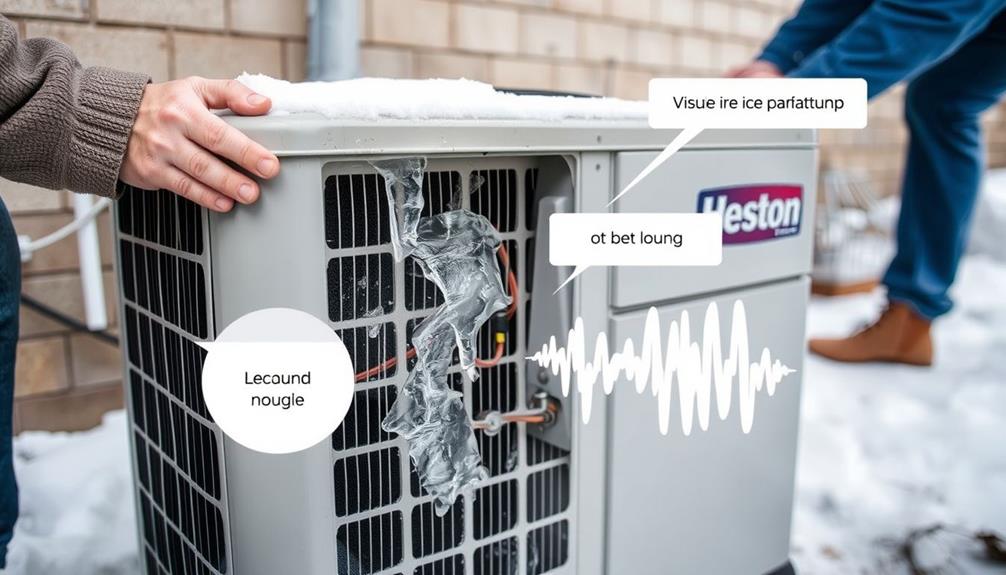
Experiencing performance and noise issues with your heat pump can be frustrating, but understanding the common culprits can help you address them effectively. One major concern is short cycling, where your heat pump frequently turns on and off, leading to excessive wear on the system. This often results from clogged dirty air filters or an oversized unit that requires assessment by an HVAC technician.
Regular maintenance, such as budget-friendly vacuum options, can also help prevent airflow issues that affect your heat pump's performance.
Unusual noises like rattling, banging, or screeching are another red flag. These sounds may indicate loose components or issues with the compressor, which necessitates immediate inspection to prevent further damage. If you hear abnormal sounds, it could also point to worn bearings or a failing fan motor, both of which need professional evaluation.
Dirty air filters restrict airflow, causing performance issues and overheating. To maintain efficiency, replace them every 1 to 3 months.
Regular maintenance, including checking for loose parts and cleaning components, can greatly enhance your heat pump's performance and longevity while minimizing noise-related issues. By staying proactive, you can guarantee your heat pump runs smoothly and quietly.
Insufficient Heating or Cooling
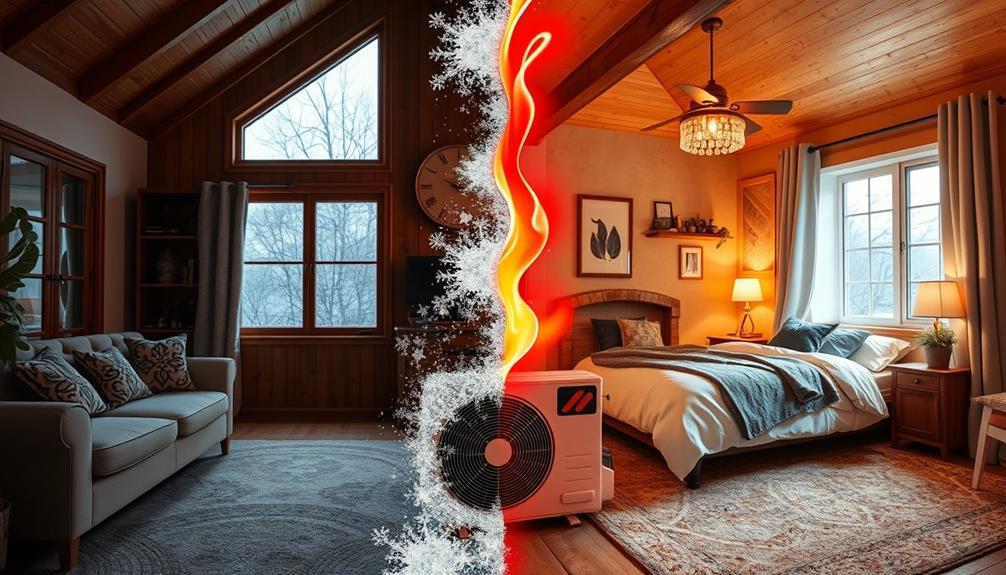
When your heat pump isn't providing sufficient heating or cooling, it can quickly become a source of discomfort in your home. Addressing this issue involves a few common culprits you can check:
- Dirty Air Filter: A clogged or dirty air filter can restrict airflow, leading to insufficient heating. Make sure to check and replace it every 1-3 months. Keeping the air filter clean not only improves heating efficiency but also supports effective treatment of depression by ensuring better air quality in your living environment.
- Low Refrigerant Levels: If your heat pump isn't heating properly, it could be due to low refrigerant levels from leaks. This requires a qualified HVAC technician to locate the leaks and recharge the system.
- Malfunctioning Thermostat: A thermostat that displays incorrect temperatures or doesn't communicate properly with the heat pump can result in inadequate heating or cooling. Recalibration or replacement might be necessary.
Additionally, inspect the outdoor unit for obstructions like debris or ice buildup, as these can hinder performance.
Regular professional maintenance is crucial for ensuring peak operation and addressing issues before they lead to insufficient heating. By following these troubleshooting tips, you can enhance your heat pump's efficiency and comfort in your home.
Common Heat Pump Issues
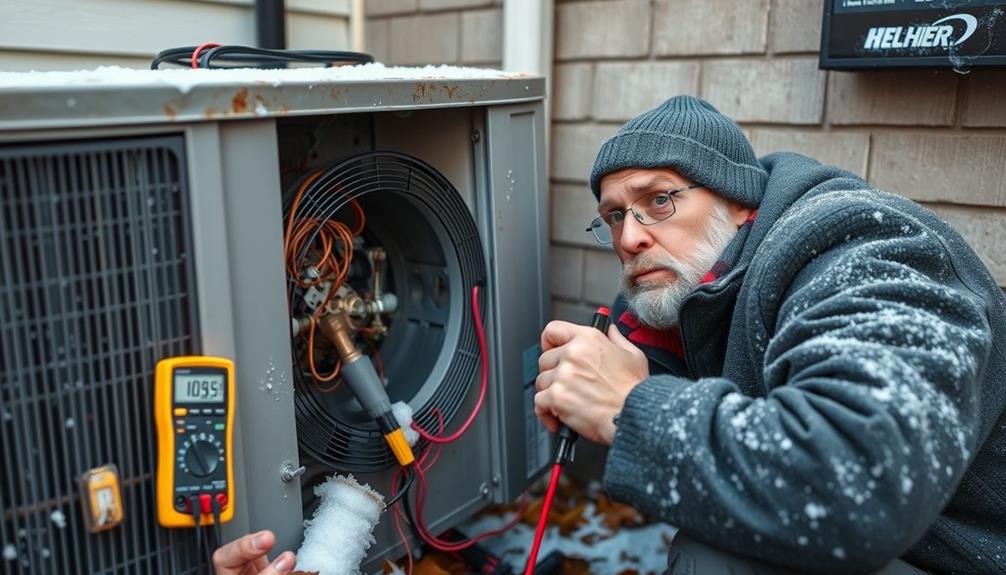
Heat pumps can encounter a variety of issues that affect their performance and efficiency. One common problem is blowing cold air in heat mode, often caused by incorrect thermostat settings or malfunctioning components.
If you notice your heat pump frequently cycling on and off, known as short cycling, it might be due to dirty air filters, faulty thermostats, or refrigerant levels being too low. Additionally, understanding the importance of diverse flying environments can parallel how regular maintenance and various operational conditions impact heat pump performance.
During winter months, ice buildup on the outdoor unit can also be a significant issue. This can stem from inadequate airflow or low refrigerant levels, which restricts proper heat exchange.
To keep your heat pump running smoothly, regularly check the outdoor unit for debris that might obstruct airflow.
Furthermore, if you're experiencing inconsistent temperature control throughout your home, it could indicate problems with your ductwork or the heat pump's ability to effectively distribute heated or cooled air.
Addressing these common heat pump issues promptly can enhance your system's performance and comfort in your home. By staying vigilant about these potential problems, you can guarantee your heat pump operates efficiently.
Troubleshooting and Maintenance Tips
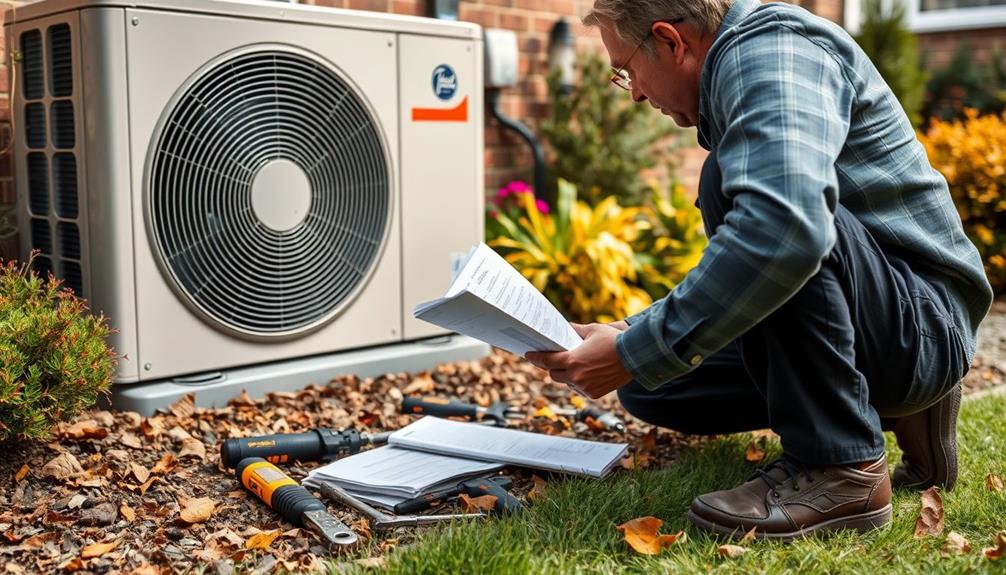
To keep your heat pump running efficiently, it's essential to implement effective troubleshooting and maintenance practices. By taking proactive steps, you can address heat pump issues before they escalate.
Regular maintenance can greatly enhance the reliability of your system, much like how attention to detail is critical in software quality assurance.
Here are three fundamental tips to help you maintain your heat pump:
- Check Air Filters: Regularly clean or replace air filters every 1-3 months. This guarantees optimal airflow and prevents overheating, which can lead to more severe problems down the line.
- Inspect the Outdoor Unit: Clear any debris around the outdoor unit to maintain unrestricted airflow. This is crucial for efficient operation and can help avoid refrigerant level issues.
- Monitor Thermostat Settings: Regularly verify that your thermostat settings are correctly adjusted for your desired heating or cooling mode. Incorrect settings can lead to inefficient operation and increased energy costs.
Additionally, schedule annual professional maintenance to assess system performance and check refrigerant levels.
Don't ignore signs of water leakage, like pooling around the unit; check for clogged condensate drains and frozen evaporator coils.
When to Call a Professional
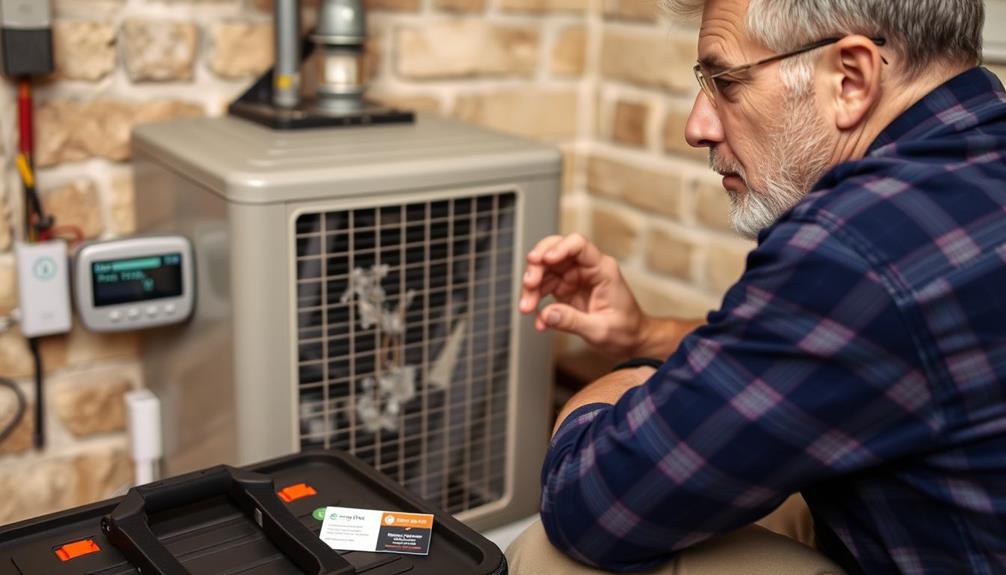
Recognizing the right moment to call in a professional can save you time and prevent further damage to your heat pump. If you notice that your system isn't heating or cooling effectively after checking the thermostat and air filter, it's likely time to contact an HVAC professional for a thorough diagnosis.
Unusual odors, such as musty or burning smells, indicate potential heat pump issues that require immediate attention. Additionally, persistent electrical problems like tripped breakers or blown fuses can pose safety hazards, making it vital to enlist the help of a professional technician.
Complex problems, including refrigerant leaks or compressor issues, need specialized knowledge and tools, so don't hesitate to seek assistance. If your troubleshooting efforts and routine maintenance don't resolve the issues, contacting a qualified technician will guarantee accurate diagnostics and proper repairs.
Taking action early not only helps maintain your home heating and cooling efficiency, but it also prevents small issues from escalating into costly repairs.
Frequently Asked Questions
How to Diagnose Heat Pump Problems?
To diagnose heat pump problems, check your thermostat settings first. Then, inspect air filters for clogs, examine the outdoor unit for obstructions, listen for unusual noises, and monitor for short cycling or inconsistent temperatures.
Can a Faulty Thermostat Cause a Heat Pump Not to Work?
A stitch in time saves nine. Yes, a faulty thermostat can definitely stop your heat pump from working. It can misread temperatures or disrupt signals, leading to heating or cooling issues that frustrate you.
Why Is My Heat Pump Blowing Cool Air but Not Cooling My House?
If your heat pump's blowing cool air but not cooling your house, check the thermostat settings, clean or replace the air filter, and verify the outdoor unit isn't blocked. Refrigerant levels might also need checking.
Why Is My Heat Pump Running but Not Blowing Air?
When your heat pump runs like a car engine without moving, check the blower motor first. It could be a tripped breaker or dirty filters. Inspect the thermostat and ductwork to verify proper airflow.
Conclusion
In summary, tackling heat pump issues can save you time and money, not to mention keep your home comfortable year-round. Did you know that nearly 70% of heat pump failures stem from simple maintenance oversights? By staying proactive and following the troubleshooting tips outlined, you can avoid many common problems. If you ever feel overwhelmed, don't hesitate to call a professional. Keeping your heat pump running smoothly guarantees your home stays cozy and efficient when it matters most!
